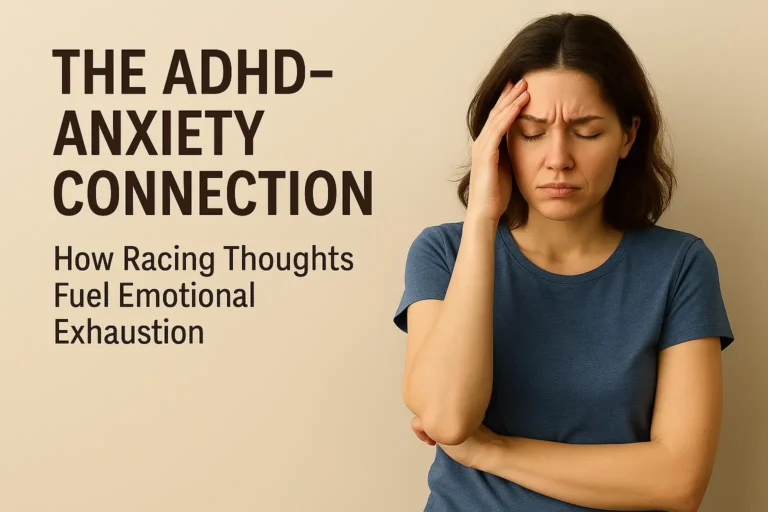The ADHD-Anxiety Connection: How Racing Thoughts Fuel Emotional Exhaustion
Insights from GloFusion – Griffin, GA
Living with ADHD can feel like your brain is always on—thoughts racing, distractions everywhere, and emotions running high. But when ADHD is combined with anxiety, the result often leads to intense mental fatigue and emotional exhaustion. This blog explores how the two conditions interact and how to manage them effectively.
At GloFusion, we support individuals navigating ADHD, anxiety, and other overlapping challenges with compassionate, evidence-based care.

Page Contents
How ADHD Sets the Stage for Anxiety
ADHD isn’t just about hyperactivity or forgetfulness—it involves difficulty regulating attention, emotions, and impulses. These challenges can create stress in daily life, which may spiral into anxiety over time.
Ways ADHD contributes to anxiety:
🧠 Executive dysfunction leads to missed deadlines and disorganization
📉 Negative feedback from others erodes confidence
💬 Constant internal dialogue amplifies self-doubt
🚷 Difficulty managing uncertainty triggers worry
📚 Overwhelm from multitasking leads to mental shutdown (CHADD)
The American Psychiatric Association notes that nearly 50% of adults with
ADHD also experience anxiety disorders, underscoring how closely intertwined the conditions are.
The Role of Racing Thoughts and Cognitive Overload
People with ADHD often describe their mind as a “browser with too many tabs open.” When anxiety is added, the tabs become frantic—obsessing over outcomes, second-guessing decisions, and fearing failure.
Signs of cognitive overload from ADHD and anxiety:
🔁 Repeating the same thoughts over and over
📱 Difficulty turning your brain off at night
🛌 Struggling to fall asleep due to mental hyperactivity
📘 Over-preparing or avoiding tasks altogether
😩 Emotional exhaustion from constant self-monitoring (ADDitude Magazine)
At GloFusion, we help clients identify when thought spirals are rooted in ADHD, anxiety, or both—and offer tools to disrupt the cycle.
Emotional Exhaustion: The Hidden Cost of Mental Overdrive
When your brain never stops running, your body eventually pays the price. Emotional exhaustion is more than being tired—it’s a state of mental burnout, detachment, and hopelessness, often mistaken for laziness or apathy.
Symptoms of emotional exhaustion linked to ADHD and anxiety:
💔 Feeling overwhelmed even by small tasks
🧠 Inability to focus, even after resting
😟 Increased irritability or mood swings
🚷 Social withdrawal and low motivation
💬 Frequent feelings of failure or inadequacy (Mayo Clinic)
Left untreated, this exhaustion can lead to clinical depression or anxiety disorders, making early intervention critical.

Effective Strategies for Managing Both ADHD and Anxiety
Fortunately, there are tools to manage both conditions—many of which overlap. Treatment often involves a combination of behavioral therapy, medication, mindfulness, and lifestyle adjustments.
Ways to regain control and reduce overwhelm:
🧘 Practice mindfulness and grounding techniques to slow thought spirals
📋 Use planners or time-blocking apps to manage tasks
💊 Consider medications like stimulants or SSRIs under professional guidance
💬 Try Cognitive Behavioral Therapy (CBT) for thought restructuring
🛏 Prioritize sleep hygiene to reset your nervous system (NIMH)
At GloFusion, we help clients create personalized plans that address both ADHD and anxiety symptoms to build a calmer, more focused life.
Conclusion: You're Not Lazy—You're Wired Differently
If you’re living with ADHD and anxiety, you’re not alone—and you’re not broken. You’re navigating a brain that works overtime. With understanding, tools, and support, you can calm the chaos and reclaim your energy.
👉 Need help managing ADHD and anxiety? Contact GloFusion in Griffin, GA to get started with supportive, tailored mental health care.

